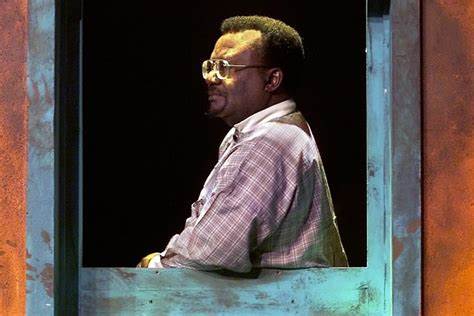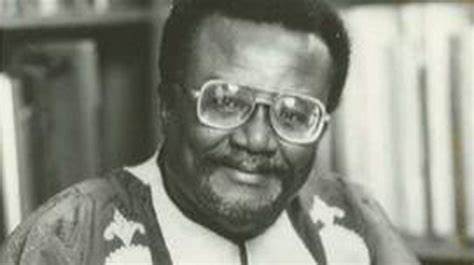Olawale Gladstone Emmanuel Rotimi, best known as Ola Rotimi (13 April 1938 – 18 August 2000), was one of Nigeria‘s leading playwrights and theatre directors. He has been called “a complete man of the theatre – an actor, director, choreographer and designer – who created performance spaces, influenced by traditional architectural forms.”
Biography
 Early life
Early life
Rotimi was the son of Samuel Gladstone Enitan Rotimi a Yoruba steam-launch engineer (a successful director and producer of amateur theatricals) and Dorcas Adolae Oruene Addo an Ijaw drama enthusiast. He was born in Sapele, Nigeria; cultural diversity was a recurring theme in his work. He attended St. Cyprian’s School in Port Harcourt from 1945 to 1949, St Jude’s School, Lagos, from 1951 to 1952 and the Methodist Boys High School in Lagos, before travelling to the United States in 1959 to study at Boston University, where he obtained a BA in fine arts. In 1965, he married Hazel Mae Gaudreau;[6] Hazel also studied at Boston University, where she majored in opera, voice and music education. In 1966 he obtained an MA from Yale School of Drama,[nb 1] where he earned the distinction of being a Rockefeller Foundation scholar in playwriting and dramatic literature.
Theatrical career
Rotimi often examined Nigeria’s history and local traditions in his works. His first plays, To Stir the God of Iron (produced 1963) and Our Husband Has Gone Mad Again (produced 1966; published 1977), were staged at the drama schools of Boston University and Yale, respectively.
Later years
Upon returning to Nigeria in the 1960s, Rotimi taught at the University of Ife (now Obafemi Awolowo University), where he founded the Ori Olokun Acting Company,[8] and Port Harcourt. Owing, in part, to political conditions in Nigeria, Rotimi spent much of the 1990s living in the Caribbean and the United States, where he taught at Macalester College in St. Paul, Minnesota. In 2000 he returned to Ile-Ife where he lectured in Obafemi Awolowo University till his demise. Hazel (his wife) died in May 2000, only a couple of months before Rotimi’s death.
His later dramas include The Gods Are Not to Blame (produced 1968; published 1971), a retelling of Sophocles‘ Oedipus Rex[8] in imaginative verse; Kurunmi and the Prodigal (produced 1969; published as Kurunmi, 1971), written for the second Ife Festival of Arts; Ovonramwen Nogbaisi (produced 1971; published 1974), about the last ruler of the Benin empire; and Holding Talks (1979).
Later plays, such as If: A Tragedy of the Ruled (1983) and Hopes of the Living Dead (1988), premiered at the University of Port Harcourt and was a common play in Obafemi Awolowo University Drama Department. The radio play Everyone His/Her Own Problem, was broadcast in 1987. His book African Dramatic Literature: To Be or to Become? was published in 1991.
Rotimi, a patriot who shunned the attraction of the West and Europe and returned home to contribute his own quota to nation building, was a rare breed. Diminutive in size but a giant in drama in Africa, he was one of the best things that could have happened to the literary community.
His dream of directing a play of 5000 cast members materialised at the Amphi Africa Theater when he was being put to rest as the crowd was drawn to a manuscript of the day’s program outline. People made dramatic entry and exit to the stage around his casket with the man turning his casket.
Rotimi spent the second half of his last creative decade reworking two of his plays – Man Talk, Woman Talk and also Tororo, Tororo, Roro – and the result, unpublished at the time of his death in 2000, have now been published under the title The Epilogue. were probably meant as an epilogue to both Rotimi’s theatrical and comic careers, which span the entire spectrum of his career.
It is comical and the language used is a version of “Nigerian English” (for example: “Se you get?” “I called God on him”).
The works are also a social satire and this publication will spur renewed interest in his satires. Rotimi is sure to be remembered as a model in the literary genre whose views have shaped the conduct of the theatre and whose plays have demonstrated the power of drama to shape the thinking of the society and attempted to solve some of the problems encountered in everyday living.







